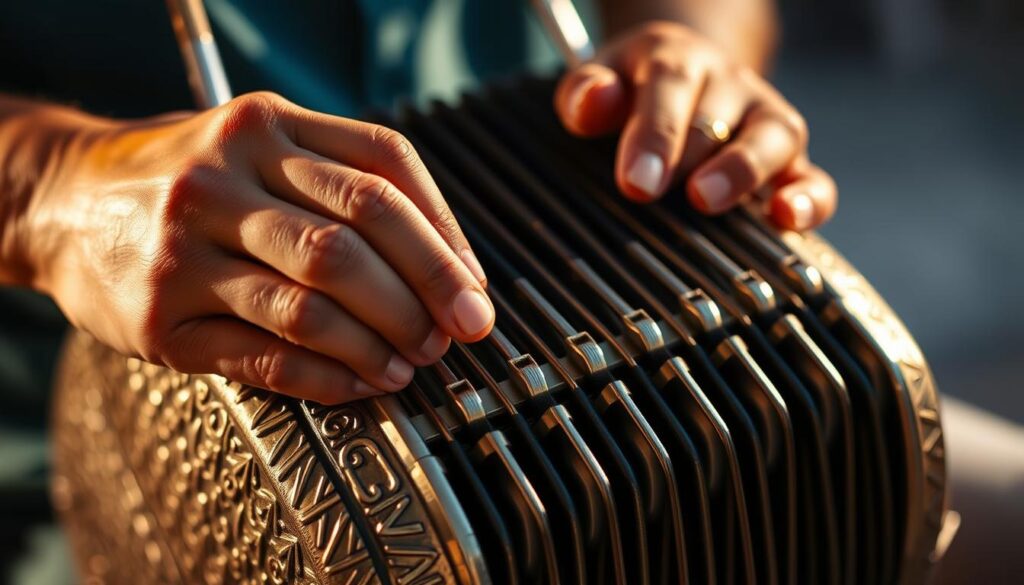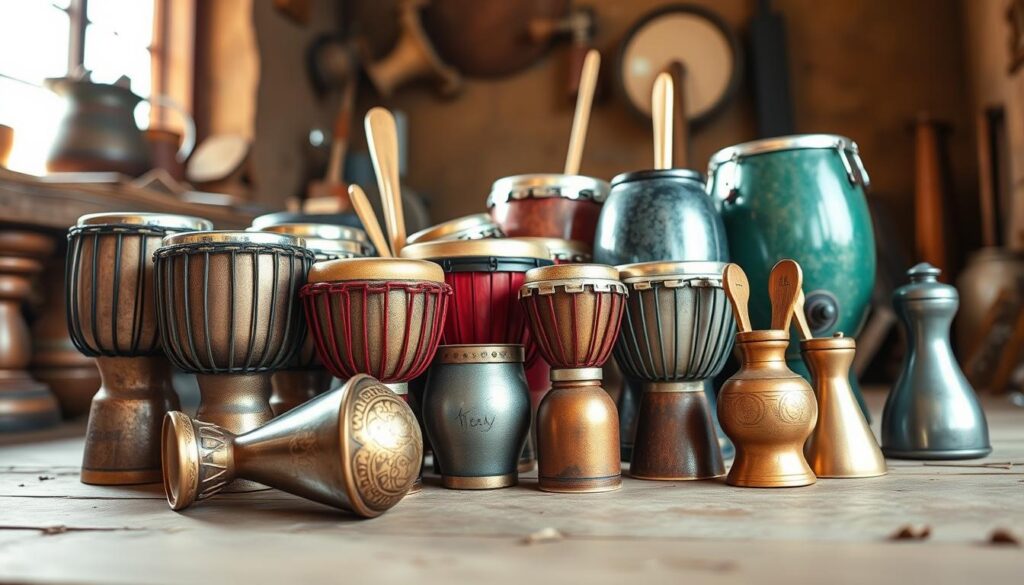Reco-reco: The Metallic Rhythm of Forró and Samba
This article will show you how the reco-reco is essential in famous musical styles. Let's see how it brings unique metallic sounds to the lining and the sambaThese sounds are essential to the vibrant and rich music of Brazilian culture.
Advertisements
Introduction to Reco-reco
THE reco-reco is a percussion instrument very important. It is used at parties and Brazilian music. It is famous for lining and by samba.
Their music is captivating and brings rhythms that are essential in many cultural celebrations.
THE reco-reco It's more than just a simple sound. It's an important part of Brazilian culture. It's made of metal or bamboo and has grooves.
Advertisements
These grooves make a rhythmic sound when a stick passes through them.
For those who love Brazilian music, understand the reco-reco is essential. It not only provides incredible sound, but also represents tradition and cultural authenticity. During Carnival, the reco-reco is crucial to the rhythm and movement of the parades.
History and Origin of Reco-reco
The reco-reco's history begins with Afro-Brazilian and Indigenous traditions. The instrument was made from natural materials. Early versions were made of bamboo or wood, with notches to produce sound.
Over time, the reco-reco has evolved, reflecting Brazil's cultural diversity. Africans brought musical influences that blended with traditional ones. This helped create genres such as samba and the lining.
First, the reco-reco was used in ceremonies and parties. Later, it became essential in popular music, such as sambaThis showed its versatility and cultural importance.
Today, the reco-reco is much more than its humble origins. With the use of metals, it gained a richer sound. Its history is an example of Brazil's creativity and cultural strength.
| Evolution of Reco-reco | Materials Used |
|---|---|
| Primitive versions | Bamboo, wood |
| Colonial evolution | African adaptations, introduction of metals |
| Modern modifications | Metals, sound enhancement |
The history of reco-reco is incredible, from its roots to today's stages. It showcases Brazil's musical evolution. Understanding its origin helps to appreciate the Brazilian music today.
What is Reco-reco and How Does It Work?
The reco-reco is a traditional instrument from Brazil, widely used in samba and liningIt's made of bamboo with metal springs that create grooves. When you scrape a stick along these grooves, it produces a unique, vibrant sound.
To understand the reco-reco operation, it is important to know your characteristicsThe interaction between the stick and the metal grooves creates its special timbre. See the main characteristics below:
| Material | Description |
|---|---|
| Bamboo | Base piece with grooves where the stick is scraped |
| Metal | Springs that amplify and enhance sound |
| Stick | Small stick used to scrape the grooves |
The Role of Reco-reco in Samba
The reco-reco is essential in samba. It brings rhythmic complexity and texture. This percussion instrument not only complements the base, but also enriches the samba rhythm.
The reco-reco's metallic sound is unique. It brings dynamism and vibrancy to the songs. In samba circles, the reco-reco stands out for its ability to create rich sonic layers.
The reco-reco also defines samba's identity. Synchronized with the tambourine and surdo, it elevates the sound experience. This makes samba both traditional and innovative.
The Reco-reco in Forró
The reco-reco is crucial to softening the rhythm of forró. Made of metal or bamboo, it brings a unique musical texture. This blends perfectly with the accordion and triangle, creating a characteristic sound. Brazilian forró.
The inclusion of the reco-reco changed forró music. See the table below to better understand its function:
| Instrument | Main Function | Contribution to the Melody |
|---|---|---|
| Accordion | Harmony and melody | Creation of musical phrases and harmonic accompaniment |
| Triangle | Marking the rhythm | Imposition of time and rhythm of forró |
| Reco-reco | Rhythmic texture | Complement of string instruments, adding melodic richness |
In conclusion, the reco-reco is not just an accompaniment. It is fundamental to the sonic identity of Brazilian forróEach touch of the reco-reco enriches the music, making it richer and more complex.
Techniques for Playing Reco-reco
For musicians who want learn reco-reco, it is crucial to know some musical techniquesThe first step is to understand the right pressure for the stick. This changes the sound, making it softer or stronger.

Speed and consistency of your scraping are essential. Start slowly and increase your speed as you become more confident and precise.
Another important point is playing in sync with other instruments. In samba and forró, the reco-reco helps create a rich sound. It's important to practice with a band to understand its role.
Adopt these musical techniques It can be challenging at first. But with practice, you'll improve. With time and dedication, anyone can become a reco-reco master.
Maintenance and Care of the Reco-reco
To make your reco-reco last longer and sound better, it's important to take care of it. conservation of reco-reco It starts with cleaning. Remove dust and dirt with a dry cloth. Avoid chemicals that could damage the instrument.
Check the springs on your reco-reco, if available. Worn springs can affect the sound. If your reco-reco is made of bamboo or wood, check for cracks or warping.
Keep your reco-reco in a well-ventilated place away from moisture. This prevents mold growth, which can damage the instrument. In short, caring for your reco-reco is simple. But it's essential for it to last longer and sound better, which is important for any musician.
Interesting Facts About the Reco-reco
The reco-reco is a fascinating instrument steeped in history. It's incredibly versatile and can be made from a variety of materials, including recycled materials.
This demonstrates the creativity and sustainability of Brazilian musical culture. The reco-reco can be made of metal, bamboo, or wood. This creates a variety of sounds that enrich samba and forró.
An interesting fact is that reco-reco is very old in samba. Its origin comes from African traditions. It was incorporated into traditional samba and is still very important today.
The Cultural Role of Reco-reco in Brazilian Music
The reco-reco is more than an instrument; it is a link between generations. It shows the Brazilian culture authentically. With African origins, it is used in samba and forró.
In Brazilian celebrations, the reco-reco is essential. It brings a unique and captivating rhythm. Furthermore, conveys stories and emotions by its sound.
THE cultural influence The reco-reco tradition is profound. It's important in capoeira circles. And it unites people around a cultural heritage.
Bamboo, metal, and wood are used to make a reco-reco. Each material produces a different sound. This makes the reco-reco versatile and essential for striking rhythms.
| Type of Reco-reco | Material | Characteristic Sound |
|---|---|---|
| Bamboo | Natural Bamboo | Smooth and Organic Sound |
| Metal | Steel or Aluminum | Sharp and Penetrating Sound |
| Wood | Solid Wood | Intermediate Timbre |
In short, the reco-reco in Brazilian culture is a vibrant symbol. It shows Brazil's identity and tradition. And it involves new generations in Brazilian music.
Musical Styles Other Than Samba and Forró That Use the Reco-reco
The reco-reco is more than just an instrument in samba and forró. It's used in many other musical styles. This shows how versatile and important the reco-reco is in Brazilian music today.
In axé, the reco-reco provides a rhythmic sound that enhances the genre's energy. Artists like Ivete Sangalo and Daniela Mercury use the reco-reco to add rhythm to their songs.
Funk carioca also benefits from reco-reco. DJs like DJ Marlboro and DJ Renan da Penha use it to add a special touch to the rhythm.
In modern MPB, the reco-reco is used in many ways. Artists like Caetano Veloso and Gilberto Gil demonstrate how the reco-reco can be essential in complex songs.
This variety of use shows the importance of reco-reco in different styles. It shows that the reco-reco can enrich many types of music, making it essential in Brazilian music.
The Reco-reco in International Music
THE reco-reco in world music is a fact. It shows the rich influence that spreads across cultures. This Brazilian instrument, previously known only in samba and forró, is now found in many genres. In world music, its unique sound helps create innovative rhythms.
Node jazz fusion, the reco-reco has found a new home. Artists around the world use it to add a special touch to their music. It also appears in film and theater soundtracks, bringing authenticity and exoticism.
The popularity of reco-reco in world music comes from its versatility. It unites different musical traditions. In cities like New York and Tokyo, its sound is heard in many places, demonstrating its global importance.
THE international influence of reco-reco is growing. This shows that, even with so many technological innovations, traditional instruments still have a place. The reco-reco stands out in modern music and in cross-cultural collaborations.
Instruments Similar to the Reco-reco
When we think about similar instruments When it comes to reco-reco, the guiro and washboard come to mind. They are part of different musical traditions, but share the principle of scraped percussion.
The guiro is widely used in Caribbean and Latin music. It's made from a gourd and has grooves that are scratched with a stick, producing a distinctive sound. The washboard, or washboard, has roots in jazz and blues. It's played with thimbles or small objects to create complex rhythms.

| Instrument | Material | Common Use |
|---|---|---|
| Reco-reco | Metal or wood | Samba, Forro |
| Guiro | Gourd | Caribbean, Latin Music |
| Washboard | Metal | Blues, Jazz |
These instruments, from reco-reco family, show the diversity of scraped percussion. Each has its own peculiarities and traditions.
Conclusion
The reco-reco is a rich and important musical symbol of Brazil. It has roots in samba and forró. It is also used in other musical styles.
This instrument is simple, but it has a huge impact on music. It showcases Brazil's cultural richness.
The reco-reco is essential to Brazilian music. It's used at parties, samba circles, and June festivals. This demonstrates its importance to the country's musical traditions.
It's not just an instrument. It's a cultural symbol that unites generations. By valuing the reco-reco, we preserve Brazil's sonic heritage.
This connects us to our musical past. And it continues to enchant people all over the world.
